Keynote addressed delivered by Garry Kasparov on September 12, 2019, in Toronto at the Molotov-Ribbentrop Pact 80th Anniversary (“The Black Ribbon Day Conference”) at The University of Toronto.
Thank you. My thanks to Bob Rae for that introduction… I can only answer that I do this because I do what my mother told me, and follow the words of the Soviet dissidents: “Do what you must, and so be it.”
Minister Freeland, thank you for your unflinching defense of human rights and democracy worldwide. And thanks to my friend Marcus Kolga, and everyone who organized this important event. I’m honored to be here today. And it’s always a pleasure to be in Canada, the uncompromising leader of the free world! Or what’s left of it!
I arrived in Toronto from New York City and did some interviews with Canadian television and they asked me about your elections. I said I envied you, because you are about to have elections and you don’t know the outcome! And that it’s rare pleasure to observe elections in a democratic country without a top-tier pro-Putin candidate and without direct Russian interference. But stay vigilant!
This has been a difficult speech to prepare, because it seems like every day there is breaking news related to our topic—hardly typical for an 80th anniversary. But remembering the facts and lessons of the Molotov-Ribbentrop Pact are more necessary today than ever because they are under attack like never before. The Kremlin propaganda machine is applying its methodology not only to its current crimes and to foreign elections, but to historical events like World War II. There is now a massive Russian misinformation campaign to rehabilitate the Pact as a brilliant strategy by Josef Stalin instead of what it plainly was: criminal collusion between two dictatorships that launched a world war.
Yes, after decades of denial, followed by a few years of denunciation during the fall of the USSR, Putin’s Russia is now openly embracing the agreement between two dictators that led directly to the greatest human catastrophe the planet has ever seen. The pact is now a staple ingredient in Russia’s leading export of fake news—or as it’s called inside Russia, “news”.
Why this revisionism and why now? It isn’t merely to maintain the Soviet-Russian narrative of the Great War, although that plays a part. Putin is reviving the Soviet attitude that World War II basically began in June 1941, when Hitler invaded the USSR. This ignores the year and a half that Hitler and Stalin spent as allies, with the Soviet Union invading from the East and also providing natural resources to Germany, resources that were used to attack Western Europe.
Let me state that again plainly here at the start. Hitler and Stalin were allies. They started World War II together with the goal of enslaving Europe between them. So eager for a deal was Stalin that he replaced his foreign affairs minister, the Jewish Maxim Litvinov, with Molotov in order to gain Hitler’s favor. And it worked.
The Soviet Union was a principal aggressor, waiting just 17 days to shift the blame to Hitler before stabbing Poland in the back. The Red Army attacked Poland as eagerly as did Germany, and they met as friends in the middle. On September 22, 1939, conquering Soviet and German forces held a joint victory parade in the Polish city of Brest-Litovsk, before the German military withdrew back behind the line agreed by Molotov-Ribbentrop. Less than a year later, the Baltic states were next to be occupied and annexed by the USSR. People who wanted only independence were trapped between two evil superior forces trying to destroy and enslave them. Even today, Ukrainian and Baltic patriots are slanderously accused of having been fascists when all they wanted was freedom. Finland was also on Stalin’s menu, but heroic resistance and a harsh winter interfered with his plans.
And yet, because Stalin was left with no choice but to join the Allies to defeat Hitler, history and the present are much kinder to him. In the aftermath of the war, it was inconvenient to talk too much about Uncle Joe’s alliance with Hitler in 1939, or his other crimes. The author of the Holodomor genocide was welcomed as an equal on the world stage. Even after Winston Churchill warned the world of Stalin’s threat in a speech in Fulton, Missouri, on March 5, 1946, the full role of the USSR in starting the war was rarely mentioned. There would be no accountability for Stalin or his atrocities, even as he lowered the Iron Curtain across the middle of Europe.
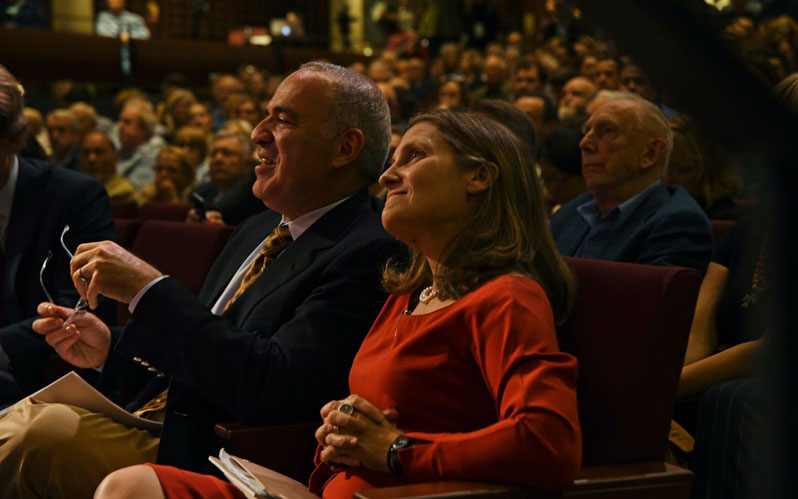
The Allied betrayal of Eastern Europe at Yalta confirmed to Stalin that the US and UK were too weak to stand up to him. Roosevelt hoped that by making these monstrous concessions, Stalin would join his new brainchild, the United Nations. And Stalin was happy to sign, knowing that he would never be bound by any international organization. It was left to Harry Truman, inspired by Churchill, to create meaningful institutions that including the CIA, NATO, and the National Security Council that saved half the world from Communist tyranny. Dictators aren’t stopped by pieces of paper, or by the United Nations charter. They are stopped by NATO.
The Nuremberg trials were underway at the time of Churchill’s famous Iron Curtain speech. Joachim von Ribbentrop became the first man sentenced to death by hanging to be executed. Von Ribbentrop’s sentencing included “crimes against peace” and “deliberately planning a war of aggression”, along with his involvement in the final solution. Some legal purists criticized Nuremberg for a lack of clear legal grounds. But good riddance, I say. The real problem with hanging von Ribbentrop after Nuremberg was that Vyacheslav Molotov was not hanging next to him. And that the KGB was not condemned along with the Gestapo.
Instead, Molotov lived to the ripe age of 96, dying peacefully in Moscow in 1986. He died five years short of seeing the collapse of the totalitarian empire he helped create. He died unrepentant for his actions under Stalin, and even continued to deny the existence of the secret protocol that he signed, revealed to the world after the war but officially denied in the USSR until 1989.
So again, why? Why is Putin’s regime working so hard to distort the facts and motives of an 80-year-old agreement? Why did he go from calling it, quote, “immoral” to “a necessary evil?” to his regime calling it this year, quote, “Stalin’s brilliant strategy”? An actual quote! The timing of this rehabilitation holds the answer.
Around five years ago, Putin and his regime began to shift their position on Molotov-Ribbentrop. Having previously condemned it, on November 5, 2014, Putin downplayed it, saying “What is so bad?” if the Soviet Union didn’t want to fight? He ignored the secret protocol and quickly returned to the usual lecture about how many more Soviets died compared to other Allied nations. Yes, the 27 million Soviet dead in a war began by Stalin. 27 million dead after Stalin ignored dozens of reports that his ally Hitler was preparing to attack the Soviet Union. 27 million dead as part of Stalin’s grand plan to destroy Poland and turn the USSR into a slave state.
The answer to why Putin changed his tune is the date, 2014, the year he invaded Ukraine and annexed Crimea, the first such aggression in Europe since the end of World War II. If you are going to imitate Stalin’s methods of repression at home and aggression abroad, you must launder those methods.
From that point on, the trend has been clear. Even the disgraceful secret protocol has been revived, along with many of the same false justifications used, such as protecting Russians in Ukraine—echoing Stalin’s claims on Eastern Poland and Hitler’s on Czechoslovakia.
Another familiar justification is the fight against fascism. As the joke goes in Russia today, no matter how many fascists support Putin, and no matter how many fascists Putin supports, Russia is always fighting fascism! Even as Putin’s regime cracks down harder and harder on every aspect of Russian civil society, including the classic tropes of anti-Semitism and the persecution of homosexuals, state propaganda tells Russians they are fighting fascists in democratic Ukraine. A country, by the way, that recently elected a Jewish president! Meanwhile, an international collection of nationalists and far-right leaders and followers profess their admiration for Putin. They know a brother in arms when they see one.
I’m not one to eagerly quote Marx and Engels, trust me!, but they were onto something when they wrote that history repeats first as tragedy, the second time as farce.
History is repeating today, but I’m afraid it’s no farce. The lack of accountability for Stalin’s crimes repeated after the collapse of the Soviet Union. There was no Nuremberg for Communism. There were no trials for the commanders of the Soviet ethnic cleansing in the Baltic states and Ukraine, or of the Soviet crackdown in East Germany in 1953, Hungary in 1956, Czechoslovakia in 1968, or Poland in 1970. There was no lustration, no truth commission, for the architects and agents of the Soviet police state. Is it really a surprise that just nine years after we celebrated pulling down the statue of KGB founder Felix Dzerzhinsky in August 1991, that a KGB lieutenant-colonel became the president of Russia? I never say “former KGB lieutenant-colonel” because, as Putin said himself, there’s no such thing as a former KGB officer.
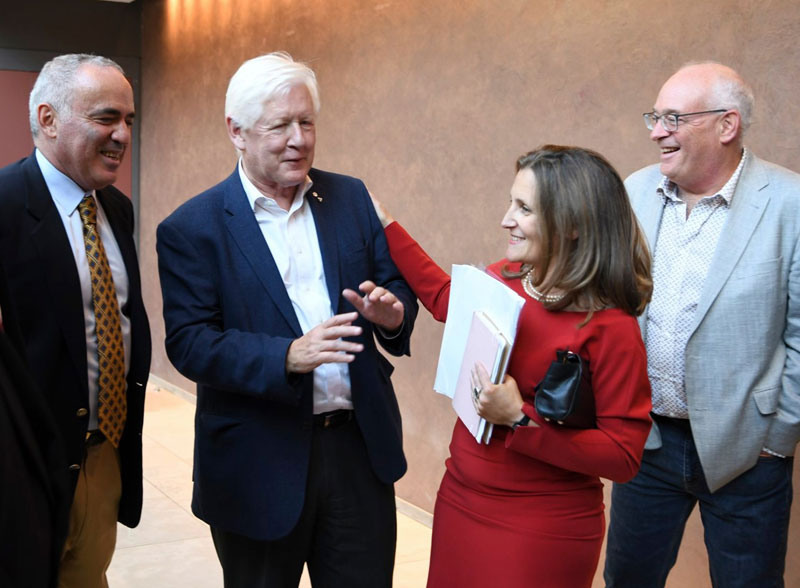
Amnesia and revisionism aren’t exclusive to Russia. Several initiatives to recognize the crimes and atrocities of Communism have failed to pass through the European Parliament. Why? Why is the swastika banned and reviled, but the hammer and sickle is seen as a valid political symbol, or even as sentimental kitsch?
Putin has positioned himself as Stalin’s successor. And this is not a wild accusation by Garry Kasparov; it is his own propaganda. Stalin is promoted as someone to be admired, even his worst crimes forgotten, even his worst betrayals now celebrated. Step by step, Putin is rehabilitating the motives and actions of one of the worst mass murderers in history. Ignoring Putin’s revanchism and aggression is a tragedy by any measure. Genocide in Syria is no farce. Support for thugs and nationalists from Venezuela to the UK to Germany is no farce. Thousands of dead in Ukraine is no farce. But once again, the leaders of the free world prefer to wait and see—but we cannot wait and see with our eyes closed.
Looking back at the history of the 1930s, Neville Chamberlain and Édouard Daladier made a terrible mistake in trusting Hitler in Munich, but you know, I can forgive them because they had no way to know what was to come. They and their constituents, remembering the horrors of the first world war, wanted peace at any price. And at least, unlike today’s leaders, Chamberlain and Daladier had no personal profit motives in their deal with the devil.
There are new Molotov-Ribbentrop pacts going on all around us today, and they are taking place out in the open, not in secret. There is an axis of autocracy with cooperation between authoritarian regimes as well as their would-be imitators in the free world. Pro-Putin rhetoric—which must be distinguished from pro-Russian, since they are opposites—is routinely heard from Hungary and Italy, not to mention the big mouth in the White House. Global freedom has been steadily declining for a dozen years, led by the spider in the center of the web in Moscow.
No more savory are the business deals with Putin and his cronies, deals that fund his engine of domestic repression, foreign hybrid wars, and perpetuate his dictatorship. Deals like the Nordstream 2 pipeline with Germany, or a Russian aluminum plant in the state of Kentucky, and French trade with Russia that went up 11% last year. The board of directors of the Russian state-owned oil giant Rosneft includes four Americans and two Germans—and I’m sure they are very well compensated. This is what we have instead of isolating Putin’s rogue regime and forcing his elites to choose between ruling like Stalin at home or living like kings in the free world.
Putin believes the West will abandon principle for profit, and so far it’s hard to say that he’s wrong. He pays for lobbyists, a global propaganda network, sports teams—all welcomed with open arms and open pockets in the free world.
Little better are the calls for peace talks and appeasement while Putin concedes nothing and continues his occupation of Crimea and his invasion of Eastern Ukraine, a war he could end in an instant—as quickly as he started it. But we are not fooled. These are not arguments for “better relations with Russia,” but for better relations with our oppressor. All of this is going on while Putin continues his campaigns of assassination and war.
Stalin needed conquest to strengthen his position and hold his shaky empire together. Here, too, Putin follows in his footsteps, attempting to distract from the disastrous state of Russia with foreign aggression. After 20 years of unchallenged power, it is difficult to explain why Russia is still doing so badly, so domestic enemies must be invented where none exist. And when those aren’t enough, dictators inevitably look outside their borders.
“War” is the correct word, no matter how you qualify it. Call it hybrid war or gray-area war, but it is a war. Putin is attacking not only his neighbors, but the institutions of the free world that he sees as threats to his power. His most dangerous allies aren’t far-right politicians or thugs in Iran and Venezuela. No, Putin’s most dangerous allies are the free world leaders who fail to stand up to him when they have the power to do so. From treating Ukraine as a buffer state, to the shooting down of MH17, to assassinations in the UK, Germany, and the US, they are happy to provide Putin with the benefit of unreasonable doubt.
I’ve often said that dictators don’t ask why, they only ask why not. Putin is interfering in elections around the world because no one will stop him. He is occupying neighboring territory because no one will stop him. And he will continue as long as he thinks no one will stop him. Eventually he will push too far, as every dictator does, driven by domestic pressure or a foreign defeat, and catastrophe will follow. But with every day Putin stays in power, the price the world will have to pay to remove an aging, paranoid, dictator will only rise.
At the start of World War II, the anti-war protesters called “Why die for Danzig?” Today it could be “Why die for Narva?” as Estonia looks on nervously while two Georgian provinces are still occupied and Ukraine remains under siege—not by so-called separatists, by the way, but by the Russian military under command of Moscow. But Putin is no Stalin, and Putin’s Russia today is a pale shadow of Stalin’s empire. The free world is in a much stronger position today, with dominant military, economic and cultural might. What is lacking is the will to use it.
Let us see with clear eyes what is happening so that we may do what must be done. Engagement has failed; it has only spread Putin’s corruption and emboldened him. If you want to change Russia’s behavior, you must threaten Putin’s grip on power in Russia. Everything else is just noise that he will ignore, and we will all live with the consequences. This means targeted sanctions on Putin’s cronies; it means removing dependence on Russian energy; it means cutting Putin’s oligarchs out of the free world they enjoy visiting so much until they must seek another path in Russia. It can be done, and, with Canada leading the way, it will be done.
The unholy alliance of 1939 enflamed the world. The choices made in 1945 led to the enslavement of half of Europe, only brought to an end by decades of sacrifice. Are we to go quietly back into a dark age of regional powers and self-interested nation-states? Are we to abandon the principles of freedom and democracy that so much blood was shed to defend? We must not.
It is all well and good to make the record clear on Molotov-Ribbentrop on this anniversary, especially on Stalin’s role as a protagonist in launching World War II. Let us take that lesson to call things as they are. Lies are lies. Murder is murder. Dictators are dictators. And just as we cannot allow history to be revised, we must not allow the distortion of what is happening now, right in front of our eyes. Thank you.
Garry Kasparov is a Russian pro-democracy leader, global human-rights activist, business speaker and author, and former world chess champion. He was born on April 13, 1963, in Baku, Azerbaijan (then USSR). He lives in New York City and travels constantly.

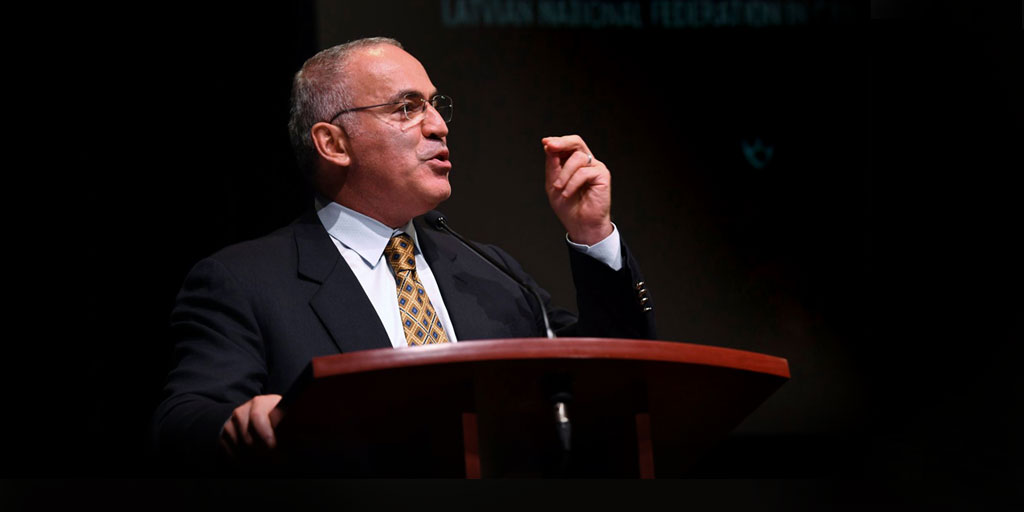
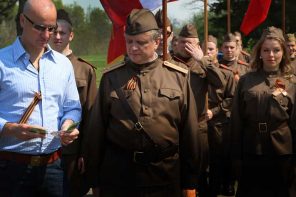

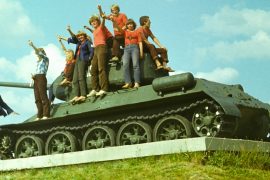
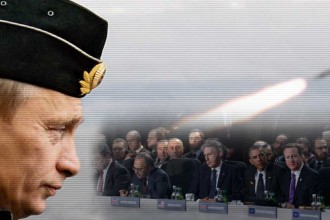
Comments are closed.